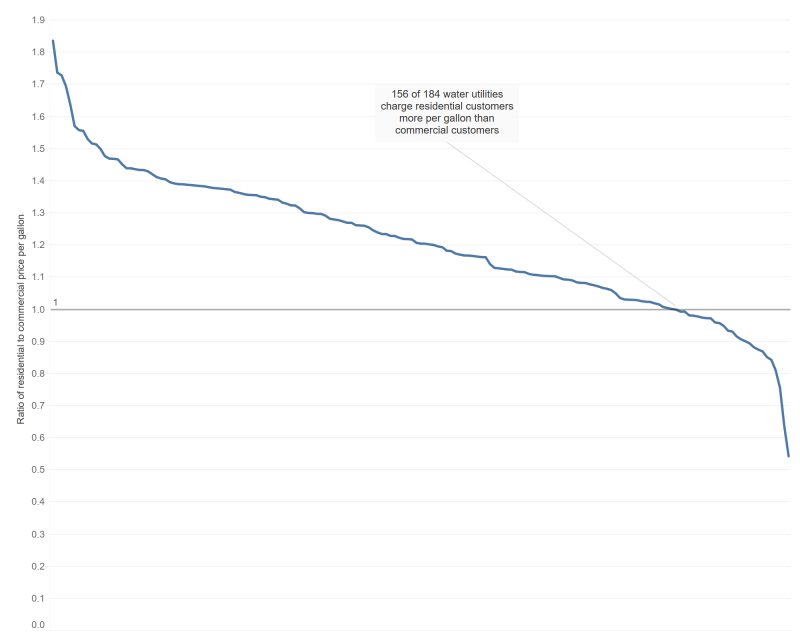The Environmental Finance Center at the University of North Carolina (UNC EFC) is hard at work on the 2022 North Carolina water and wastewater rates dashboard. We look forward to providing residential rates early in 2022. The public dashboard displays residential rates and financial data and lets a user compare both across different utilities.
For those utilities with separate rates for commercial and residential customers, UNC EFC tried to determine how much revenue comes from residential and from commercial customers. Through the North Carolina water and wastewater survey, UNC EFC collects all types of rates from utilities. Many utilities charge different rates to commercial customers than to residential customers. A utility should know how much revenue is coming from each type of customer and should distribute bills appropriately between customer types.
Available data helps us estimate statewide impacts to different customer types. UNC EFC analyzed local water supply plan data from 2018. The statewide average consumption for a metered residential connection was 5,000 gallons per month and the statewide average for a metered commercial connection was 15,000 gallons per month.
The EFC identified 184 utilities charging different rates to commercial than to residential customers in 2021. At 5,000 gallons per month the “average” residential customer across those 184 utilities would have paid $42. At 15,000 gallons per month the “average” commercial customer would have paid $115. Among utilities charging separate rates to commercial and residential customers, the average residential customer pays almost a cent more per gallon than commercial customers.
Of course, specifics matter much more than averages and specific conditions can change greatly among utilities. Figure 1 compares the rate per gallon for a residential customer using 5,000 gallons per month against the rate per gallon paid by a commercial customer using 15,000 gallons per month.

Figure 1 shows a wide range of residential to commercial ratios among utilities – in some utilities residential customers pay 1.8 times as much per gallon as commercial customers while in others residential customers pay half as much per gallon as commercial customers. 156 out of the 184 utilities charging separate commercial and residential rates charge residential customers more per gallon than commercial customers.
Take-aways for Utilities
Rates are complicated and should be designed to meet the goals of utility boards or other decision-makers. For some utilities, charging lower rates per gallon to commercial customers than to residential customers supports local employment. In some circumstances, the cost of providing service to commercial customers can be lower than the cost to provide service to residential customers. At the same time, such decisions may place an additional burden on residential customers relative to commercial customers.
To really understand rates, utilities should analyze their local circumstances. Knowing the local consumption rates and typical water consumption by low-income customers can help explain how affordable rates are for different kinds of customers. Setting rates to support a utility means balancing many competing priorities. Analyzing the amount paid by commercial and residential customers can help utilities better understand what impact that balance has on different customers.
UNC EFC can support small utilities (serving fewer than 10,000 customers) with more detailed analysis through free technical assistance. Please contact Stephen Lapp with questions – slapp@sog.unc.edu.
Caveats and Next Steps for UNC EFC
The analysis in this document focuses on one consumption point for residential customers and a separate point for commercial customers. UNC EFC collects extensive rates for NC utilities. We are working to incorporate additional data for analysis. UNC EFC is also conducting interviews to understand how different utilities use rate dashboards and other data visualizations and what additional analyses would benefit North Carolina utilities. If there is additional data you would like to see, please contact Julia Cavalier – cavalier@sog.unc.edu.


